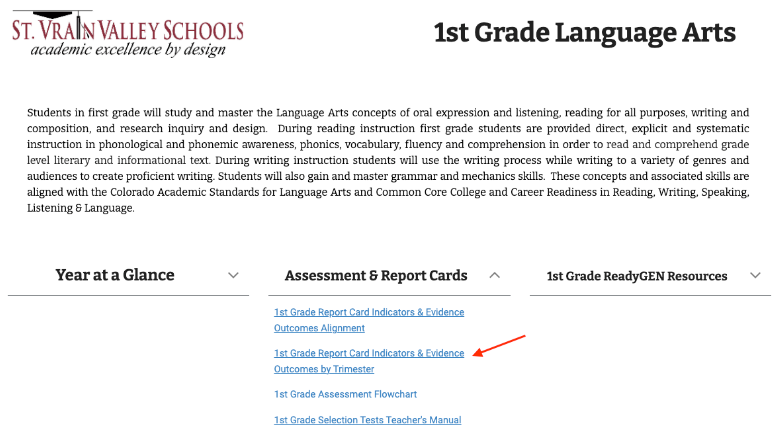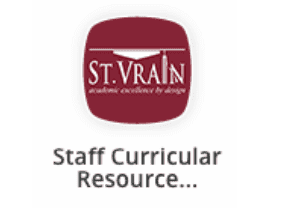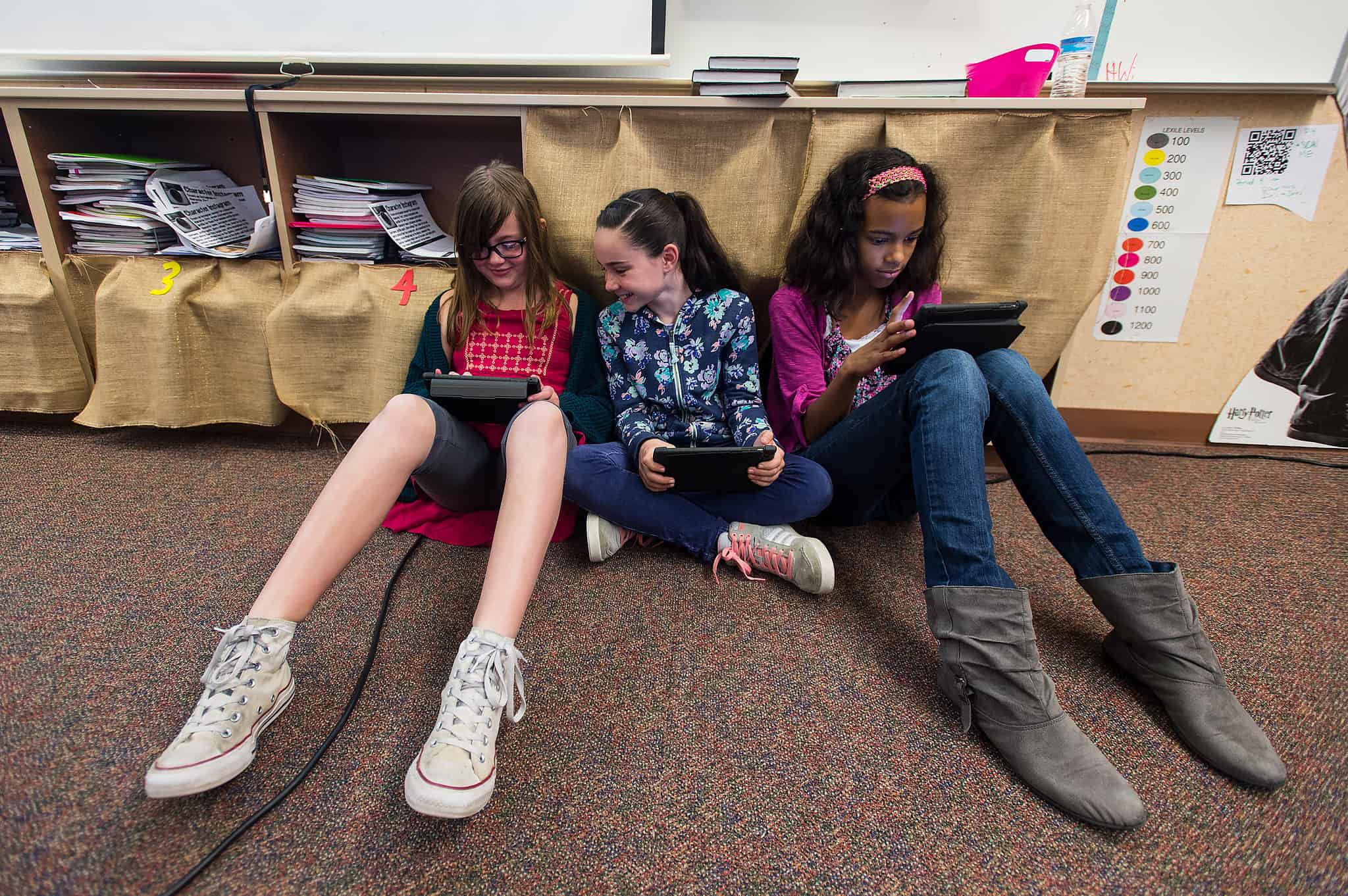October/November 2023
Evaluating a Comprehensive Body of Evidence
As the end of 1st Trimester approaches, how might we highlight the Assess & Analyze and Strong Family Engagement domains in the new St. Vrain Valley Schools Instructional Framework when reporting evidence of student learning? In thinking about report cards and celebrating academic excellence with families, consider regular and routine opportunities to:
- Involve students in ongoing reflection using feedback from self, peers, teachers, and other vetted sources
- Build student self-awareness of their strengths and weaknesses, develop their ability to use setbacks as opportunities, and foster their ability to apply their insights to future learning situations
- Create open lines of communication and trusting relationships with families through frequent touchpoints to celebrate student talents, strengths, achievements and growth opportunities
- Give families access and opportunity to provide insights about their children and how to work together
A comprehensive body of evidence isn’t limited to formal assessments and graded products. How can Thinking Maps, verbal explanations, and other process-based tasks form a complete portfolio of student learning and understanding?
As a reminder, report card documents and resources can be found here on the District website.
Math Updates
In the September NCTM President’s Message, Kevin Dykema states that
“…listening to our students and having our students listen to each other are not easy tasks. I wonder how often we anticipate what our students are going to say and then interrupt them and finish their thoughts to try to keep the class moving along. And too often, we likely finish their thoughts incorrectly. I know that when I do allow the student to complete their thought, I often immediately repeat what my student says; unfortunately, the result is that the other students in my class quickly realize that they don’t need to listen carefully to their peers because they know that I will repeat or summarize what was said. My focus has been too much on helping my students learn how to communicate their thinking and not enough on helping them learn how to listen carefully to others.”
Looking for concrete suggestions and strategies in making your classroom more student-centered where their voices, ideas, and contributions are valued? Check out these 5 Ways to Stop Thinking for Your Students or the article “Never Say Anything a Kid Can Say!” Who is doing the talking, the thinking, and the mathematics in your classroom?
ELA Updates
Looking for ways to connect with your colleagues around implementation of our core instructional resources for Elementary ELA? Registration is still open for Deepening Language Arts Instruction Using ReadyGEN! Click here for more information. Registration deadline is tomorrow (October 24th)!.
As you continue your integration of Thinking Maps in support of connected reading and writing instruction, one critical piece to keep at the forefront is the importance of oral language as a medium for processing thought. Language itself is the vehicle for learning – as adults, when we think about our ideas, we talk to ourselves as a means of processing and organizing our thinking. This “internal dialogue” needs to be transparent with students – let’s give ourselves permission to model our internal dialogue as a means of thinking through ideas. This modeled approach communicates to our students the importance of using language to elevate reading, writing, speaking, and listening!
As you prepare for summarizing Trimester 1 Student Achievement on your grade level report card, consider using the Report Card Indicators by Trimester to help focus your reporting on evidence outcomes addressed during Trimester 1. These can be found on your grade level home page in the Elementary ELA Unit Plans:

Social Studies Updates
November is a busy month in the social studies world with Indigenous Heritage month and Veterans Day on Nov. 10, 2023. I put together some resources you might be interested for both observations. Here are some resources for Veterans Day. An additional suggestion is inviting a member of your community who is a veteran in to talk with your students. It is a great way to build community AND learn about the sacrifices these people and their families made for our country.
November is Indigenous Heritage month as well! Of course, we should be including the stories and contributions of Indigenous Peoples in our lessons throughout the year, but it also is important to recognize them during this month. I put together a list of picture books we have in SORA (and some read alouds) you might share with your students as well as some great lessons using primary sources. Here is the list of resources. Using primary sources with your students encourages critical thinking skills such as inquiry, inferencing, corroboration, and analysis. Perhaps you can use a Double Bubble map and have students compare and contrast one of the picture books on the list with a primary source (like a photo or map) from one of the lessons. Then students can talk off the map and eventually write their analysis of the similarities and differences between the two sources. I hope you give it a try!
Science Updates
Changes to Elementary Science Report Cards
A reminder, the learner expectations for science have been simplified into conceptual domains across all grade levels and the evidence outcomes are aligned to the NEW 2020 Colorado Academic Standards. These conceptual domains are also the titles for each science unit in the new Elementary Science Unit Plans.
Expectations for students by grade level in Earth, life and physics science – can be found on the Year at a Glance page on the new Elementary Science Unit Plans.
Improve Reading Comprehension – Teach More Science
Think of these new science resources as an enhancement to your ReadyGEN materials. They can help your students build critical background knowledge, which is essential for reading comprehension and will also help bring your literacy standards to life.
New Unit Plans Google Sites!
These new Google Sites serve as one-stop, comprehensive collections of content area resources and curricular support for planning and instruction with cleaner navigation and aesthetics using dropdowns. The Unit Plans are only accessible through the “Staff Curricular Resources” app in ClassLink.

Professional Development Opportunities
The following classes are available for registration through the Office of Professional Development. All classes are in-person unless otherwise noted.
- Deepening Language Arts Instruction using ReadyGEN: Grade Level Collaboration (monthly meetings, session starts Thursday, October 26; 1.0 credit) (Registration will close tomorrow!)
- Thinking Maps Foundations (Saturday, October 28; 8:30 – 4:00 and Saturday, November 4; 8:30 – 4:00; 1.5 credits) (Registration will close Wednesday!)
- Essentials in Evidence-Based Literacy Instruction (Session starts Tuesday, November 7; 2.0 credits)

Contact Us!
Karen Smith
K-5 Language Arts Coordinator
303-702-7746
[email protected]
@smithkaren51 & @SVVSDLA
Mike O’Toole
K-12 Science Coordinator
303-682-7232
[email protected]
@SVVSDScience
Greg George
K-12 Mathematics Coordinator
303-682-7247
[email protected]
Visit the Math Resource Site
@SVVSDMath
Jenny Pettit
K-12 Social Studies
Coordinator
303-702-7547
[email protected]

